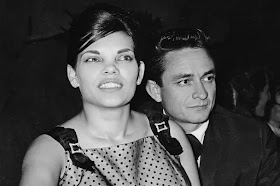Vivian Liberto was born and raised in San Antonio, Texas, where she and her siblings grew up in Sicilian-American Catholic culture and attended white schools in the segregated state. At age 17 the young beauty met 18-year-old Johnny Cash while he was stationed in San Antonio as an Air Force radio operator. Johnny was soon sent to Germany, where the young soldier began a long and loving correspondence with Vivian.
 In 1965 Johnny Cash was arrested in Texas for
bringing amphetamine pills into the
United States across the Mexican border, and Vivian flew to El Paso for his court hearing. A widely circulated photograph of them leaving the
courthouse in which Vivian appeared to be Black brought her to public notice.
In 1965 Johnny Cash was arrested in Texas for
bringing amphetamine pills into the
United States across the Mexican border, and Vivian flew to El Paso for his court hearing. A widely circulated photograph of them leaving the
courthouse in which Vivian appeared to be Black brought her to public notice. At the time, interracial marriage was unlawful in many Southern states. Vivian and Johnny were both harassed by hate mail and death threats. Flyers distributed at Cash's concerts urged people to call a phone number that played a reading of the Thunderbolt article; a voice intoned, "the race mixers of this country continue to sell records to your teenage children."
After Cash's concerts were cancelled across the South, he threatened a lawsuit against the KKK. His manager Saul Holiff arranged to have Vivian's ancestry researched, documenting her "white" racial background, allowing Johnny to be booked again in Southern venues.
 |
| Vivian and Johnny with their daughters. |
In the 2020 documentary "My Darling Vivian," her daughters told of the trauma Vivian suffered over the incident. "She was scared to death that the KKK was coming for her and that Dad would be on the road," Kathy Cash said in the film. "She had no idea what to do. Everyone knew where we lived." Vivian would keep vigil at night, smoking cigarettes and drinking coffee with a gun by her side.
In February 2021, historian Henry Louis Gates Jr., host of the PBS program Finding Your Roots, featured as a guest Rosanne Cash, Vivian and Johnny's eldest daughter who followed in her father's footsteps to become a country musician.The show confirmed Vivian's paternal Sicilian ancestry, and her mother's German and Irish ancestors. Researchers also found that one of her four maternal great-great-grandmothers was Sally Shields, a woman of mixed race who was born into slavery in Alabama. Sally's mother was an enslaved African American, and her white father and master was William Bryant Shields, a planter born in North Carolina who also fathered Sally's eight siblings. He used his wealth and political influence to gain an act of the legislature in 1848 to free all nine of his children.
According to DNA tests performed by the show, Rosanne (and her sisters) have 3.3% sub-Saharan African ancestry, including African ancestry on their father's side, although written documentation of those paternal ancestors was not found. So, Johnny's marriage to Vivian was was never illegal, since both of them had African ancestry.
 |
| Vivian with Johnny in 2003. |
Vivian Cash died of complications from lung cancer surgery in 2005, just before the release of the biopic "Walk the Line," in which she is depicted as a shrew who tried to hold back Johnny's career. Rosanne and her sisters objected strongly to the depiction of their mother in the film.
ADDENDUM: After reading (actually, listening to) Barbra Streisand's new autobiography My Name is Barbra, I was struck by the description of the scenes that were cut from "The Way We Were," to de-politicize it. Now watchable in an extended cut of the film released on its 50th anniversary, the scene where Katie (Streisand) and Hubbell (Robert Redford) break up originally centered on her having been snitched on to the HUAC committee as a communist. She sacrifices their marriage to save his career, not because of his brief infidelity. It made me wonder if Vivian did the same thing to save Johnny's career after the accusations about her race derailed it. (Of course, he was having an affair with June Carter by this time. From Vivian's perspective, June enabled Johnny's drug use as a user herself. She also wrote that June didn't pen "Ring of Fire," but rather that Johnny wrote it about a certain part of June's anatomy.)

No comments:
Post a Comment